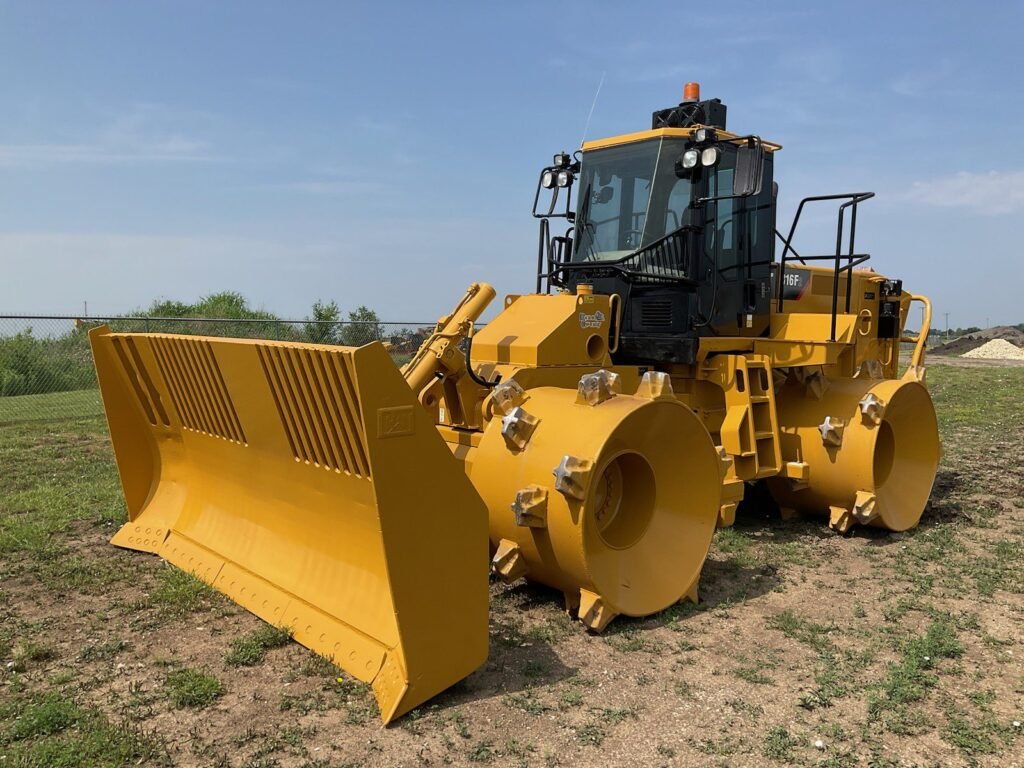
Not Destined For The Dump
Reno County Landfill’s machines get extra lives thanks to Foley Equipment’s Rebuild Program
 You know the saying “one man’s trash is another man’s treasure”? Megan Davidson knows the truth of that more than most. As the director of Reno County Landfill in Hutchison, Kansas, she turns what some consider garbage into products that look and perform just like new. And she saves hundreds of thousands of dollars every time.
You know the saying “one man’s trash is another man’s treasure”? Megan Davidson knows the truth of that more than most. As the director of Reno County Landfill in Hutchison, Kansas, she turns what some consider garbage into products that look and perform just like new. And she saves hundreds of thousands of dollars every time.How? By rebuilding the landfill’s end-of-life machines with Foley Equipment. During Davidson’s tenure, Reno County Landfill has rebuilt 10 pieces of Cat® equipment with Foley and been part of two milestones along the way: The initial rebuild, completed in 2004, was Foley’s first ever Cat Certified Power Train Rebuild.
The most recent, in 2023, marked Foley’s 400th machine rebuild overall.
“We were intrigued when they first talked to us about the rebuild program, and our experience over the years has proven the process from start to finish,” Davidson says. “It allows us to keep our equipment a lot longer.”
A new machine for half the cost
 The Cat Certified Rebuild program at Foley is based on a simple premise: The systems and components inside Cat equipment are designed for multiple lives, meaning Cat machines are built to be rebuilt. When a product reaches the end of its first useful life, the team at Foley can return it to like-new performance — incorporating the latest technology and engineering updates — for a fraction of the cost of buying new equipment.
The Cat Certified Rebuild program at Foley is based on a simple premise: The systems and components inside Cat equipment are designed for multiple lives, meaning Cat machines are built to be rebuilt. When a product reaches the end of its first useful life, the team at Foley can return it to like-new performance — incorporating the latest technology and engineering updates — for a fraction of the cost of buying new equipment.“When you do a cost analysis compared to buying new, rebuilding is a no-brainer,” Davidson says. “A brand-new dozer could cost us over a million dollars. A rebuild is around $500,000. Plus, you get your warranty back.”
That’s right — every Cat Certified Rebuild machine comes with a like-new warranty. And Davidson can attest that machines rebuilt by Foley perform just like new on the job.
“Our operators feel like they’re in brand-new equipment,” she says. “The engine feels like it has a lot more power. The transmission responds better. Even the seat has air suspension that works like it should.”
 That’s because Foley completely disassembles each machine and rebuilds it from the ground up to include all Cat product updates. More than 350 tests and inspections — plus automatic replacement of more than 7,000 parts — ensure the same high level of quality as a new Cat machine.
That’s because Foley completely disassembles each machine and rebuilds it from the ground up to include all Cat product updates. More than 350 tests and inspections — plus automatic replacement of more than 7,000 parts — ensure the same high level of quality as a new Cat machine.Three lives are better than one
Rebuilding means Cat equipment isn’t limited to a single life — and machines aren’t limited to single rebuild, either. Reno County Landfill typically rebuilds its equipment twice: scrapers at around 12,000 hours and 22,000 hours, compactors at approximately 15,000 and 25,000 hours, and dozers at about 15,000 and 27,000 hours.
The 2023 rebuild was the second for an 816F compactor, a 2009 model that works on the landfill’s construction and demolition site moving everything from asphalt shingles to wood pallets to drywall.
“The work is hard on the machine, for sure, and this compactor had to do double-duty on the trash side when our 826 was down for service,” Davidson says. “The 816F had about 24,900 hours when it went in for its second rebuild — right on the mark.”
 The ability to estimate when machines are ready for a rebuild also helps Reno County Landfill plan for new equipment purchases. Davidson expects to replace the twice-rebuilt 816F with a new model in 2027 and has already built that acquisition into the budget.
The ability to estimate when machines are ready for a rebuild also helps Reno County Landfill plan for new equipment purchases. Davidson expects to replace the twice-rebuilt 816F with a new model in 2027 and has already built that acquisition into the budget.“A compactor is a big purchase for county government,” Davidson says. “Being able to rebuild gives us the planning period to replace it. If we can properly budget for a new machine, we can pay cash versus borrowing money or relying on a lease-to-purchase program like we used to.”
Extending machine life, establishing long-term relationships
 Reno County Landfill primarily operates Cat machines on its 500-acre site, and Davidson says the ability to rebuild them with Foley is a major reason why.
Reno County Landfill primarily operates Cat machines on its 500-acre site, and Davidson says the ability to rebuild them with Foley is a major reason why.“As a government entity, we go out for bid on new equipment,” she says. “But it’s not necessarily the lowest purchase price that’s the determining factor. It’s the cost per hour of running the machine. The fact that a Cat machine can be rebuilt two or more times makes it more affordable in the long run.”
In addition to rebuilds, Foley handles 250-,500-hour, 2,000-hour service intervals on the landfill’s machines and has also provided onsite operator, technology and safety training.
“From the availability of parts to knowledge of different types of services, they’ve been great to work with from start to finish,” Davidson says. “They stand behind what they do and take pride in what they do.”
That includes pride in turning trash into treasure — from rebuild #1 to rebuild #400 and counting.




